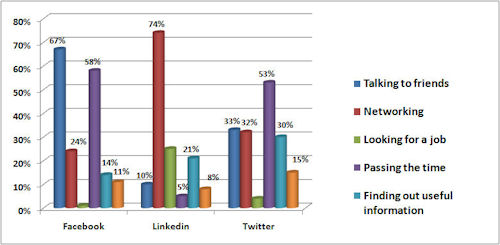In our last issue, we described online research showing how far more people use Facebook than Twitter or LinkedIn. This week, we look at other findings showing the reasons people use each site, and how they respond to advertisements.
Reasons for using social media channels

The two most popular reasons Facebook visitors use the site are for talking to friends (67 per cent) and passing the time (58 per cent). The two most popular reasons Twitter users access the site are the same, but the priorities are reversed, with most using the site to pass the time (53 per cent) and just one third using it to talk to friends. LinkedIn is clearly seen as a professional networking site, with 74 per cent of users citing this as their main reason for using it, and a quarter saying they go to LinkedIn to search for a new job.
How people interact with the three different sites appears to influence their likelihood to buy. Ads on Facebook are the most likely to elicit a response, with 25 per cent of those having seen an ad on the site acting upon it compared to 16 per cent for Twitter and 19 per cent on LinkedIn. Despite this, both LinkedIn and Twitter ads are more likely to lead to purchases, with 15 per cent of LinkedIn and 13 per cent of Twitter users making a purchase after seeing an ad on the site compared to just 8 per cent of Facebook users.
Case studies
Journalist view
Guy Clapperton, journalist and author of This Is Social Media, gives his view of how he uses the different sites professionally:
"I use Twitter because a lot of editors and PR people with a commissioning budget for corporate writing and media training seem to be on there. So first, they're like-minded people available for a natter, and second, I believe in going to my market rather than expecting it to come to me. If my wants were more social than professional, I might spend more time on Facebook, and if I were recruiting I might turn up on LinkedIn a bit more.
"One of the most intelligent uses of social media I ever found was when I was judging a small business competition last year. One of the entries said they didn't use social media – and their reason was that they'd asked their customers what they wanted and they just wanted a forum with no bells and whistles, so that's what they got. That meant that although they weren't "doing" social media it was a move based on solid research – it would have been wrong of them to try it regardless."
PRO view
James Barisic, digital strategist at consultancy Social:haus, describes the pros and cons of using Facebook and Twitter for campaigns:
“There is no doubt that you need a presence on Facebook. For many consumers, Facebook is an online safe haven and with that feeling of safety comes trust in the information being presented to them. It's as if, in the consumer's mind, the internet, being an online ‘Wild West‘, is a place where there is a lot of dodgy information. But if a business is on Facebook, it can automatically be trusted.
“The problem is that Facebook can overcomplicate things that should be simple – especially sharing and discussion – meaning that it's difficult to drive traffic within Facebook. Twitter overcomes that because it simplifies the discussion and sharing process. Personally, I think that if you're running a social media campaign on just one network, you're missing out on combined strength and you're probably doing it wrong.
“We can do traditional PR campaigns, we can do print ads and we can do radio and TV, but if clients want to do something different, if they want their clients to develop an emotional bond to their campaign or brand, that means engagement and that means Twitter. The question is then what we do with that bond – and the answer probably lies somewhere on Facebook.”
Methodology
Opinium Research carried out an online survey of 2,022 UK adults aged 18-plus from 8-10 December 2010. Results have been weighted to nationally representative criteria.
PR Masterclass: The Intersection of PR and GEO
Wednesday 25th February, both virtual and in person tickets are available.
PR MasterclassIf you enjoyed this article, sign up for free to our twice weekly editorial alert.
We have six email alerts in total - covering ESG, internal comms, PR jobs and events. Enter your email address below to find out more:








